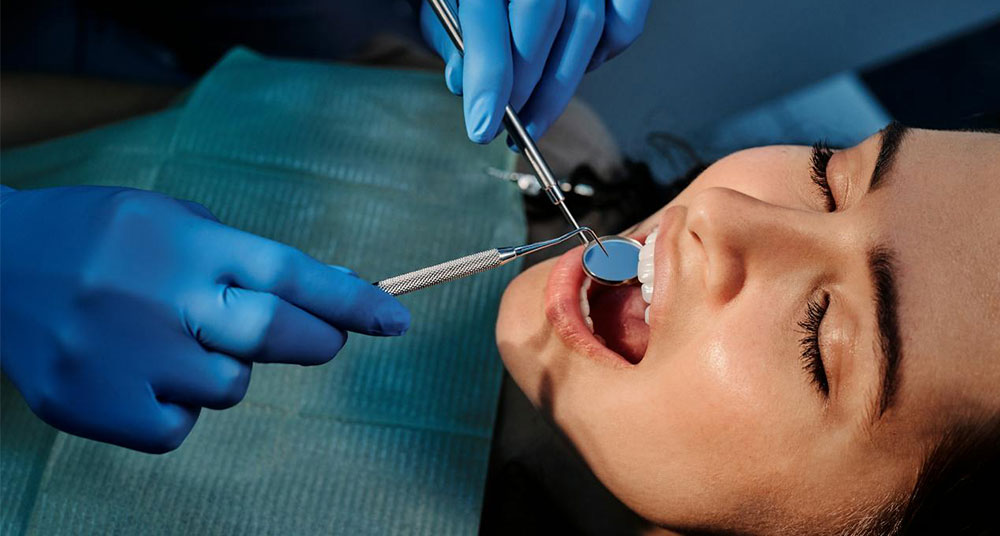Blog
Managing Tooth Sensitivity: Causes and Solutions
March 25, 2024 / DENTISTRY

Do you experience a sharp pain in your teeth when you indulge in your favorite ice cream or sip on a hot beverage?
If so, you may be one of the many individuals dealing with tooth sensitivity. This common dental issue can make eating and drinking uncomfortable, but fortunately, there are ways to manage it effectively. In this article, we'll explore the causes of tooth sensitivity and provide you with practical solutions to help alleviate your discomfort.
Understanding Tooth Sensitivity
Tooth sensitivity, also known as dentin hypersensitivity, occurs when the underlying layer of your teeth, called dentin, becomes exposed. Dentin contains tiny tubules that lead to the nerve endings in your teeth. When these tubules are exposed, external stimuli such as hot, cold, sweet, or acidic foods and drinks can trigger pain signals to your nerves, resulting in sensitivity.
Common Causes of Tooth Sensitivity
Several factors can contribute to the development of tooth sensitivity, including:
- Enamel Erosion: Acidic foods and drinks, as well as aggressive brushing, can wear down the protective enamel layer of your teeth, exposing the sensitive dentin underneath.
- Gum Recession: Receding gums can expose the roots of your teeth, which lack the protective enamel covering, leading to increased sensitivity.
- Tooth Decay: Cavities and dental caries can weaken the structure of your teeth, making them more susceptible to sensitivity.
- Bruxism (Teeth Grinding): Grinding or clenching your teeth can wear down the enamel and expose the dentin, resulting in sensitivity.
- Dental Procedures: Certain dental treatments such as teeth whitening, fillings, or crown placements can cause temporary sensitivity.
Solutions for Managing Tooth Sensitivity
If you're struggling with tooth sensitivity, here are some tips to help alleviate your discomfort:
- Use Desensitizing Toothpaste: Opt for toothpaste specifically formulated for sensitive teeth, which contains ingredients like potassium nitrate or strontium chloride to help block the pain signals to your nerves.
- Practice Proper Oral Hygiene: Brush your teeth gently using a soft-bristled toothbrush and fluoride toothpaste to avoid further enamel erosion.
- Avoid Acidic Foods and Drinks: Limit your consumption of acidic foods and beverages that can contribute to enamel erosion and sensitivity.
- Use a Fluoride Rinse: Incorporate a fluoride mouthwash into your oral hygiene routine to strengthen your enamel and reduce sensitivity.
- Wear a Night Guard: If you grind your teeth while you sleep, wearing a night guard can help protect your teeth from further damage.
Schedule regular dental checkups with us at Caledon Dental Centre to address any underlying dental issues contributing to your sensitivity and receive professional treatments such as fluoride varnishes or dental sealants.
Don't let tooth sensitivity disrupt your daily life. By understanding the causes and implementing these practical solutions, you can effectively manage your sensitivity and enjoy a pain-free smile once again. If you continue to experience discomfort, don't hesitate to reach out to your dentist for personalized care and guidance tailored to your needs.
Ready to find relief from tooth sensitivity? Schedule an appointment with us today, by calling us at (905) 843-2500, to discuss your concerns and explore treatment options. Your comfort and oral health are our top priorities!
Archive
- Debunking Common Myths About Dental Care: Separating Fact from Fiction
- Managing Tooth Sensitivity: Causes and Solutions
- The Surprising Link Between Oral Health and Heart Disease
- Proper Care and Maintenance of Dental Implants
- Exploring Cosmetic Dentistry: Procedures and Benefits
- The Benefits of Invisalign for Straighter Teeth
- The Connection Between Gum Health and Overall Well-being
- Unmasking Tooth Sensitivity: Causes, Treatment, and Prevention
- Choosing the Right Toothbrush and Toothpaste for Your Family
- Crowns, Bridges, and Dentures: Caring for Your Dental Restorations
- Dental Woes Begone: Common Dental Problems and Their Solutions
- The Importance of Regular Dental Check-ups: What to Expect
- 5 Benefits Of Wearing a Mouthguard for Contact Sports
- Myths and Facts About the Use of Fluoride in Dentistry
- Dental Emergencies: What You Need to Know
- Three Tips for Maintaining the Best Oral Hygiene and Building a Healthy Smile that Lasts
- Why it’s Time to Consider Professional Tooth Whitening
- Dental X-Rays: When and How Often Do You Need Them?
- The Differences Between Store-Bought and Custom-Fit Mouthguards
- Dental Care for Seniors
- Everything You Need to Know About Tooth Extractions
- Everything You Need to Know About Cold Sores
- The Importance of Straight Teeth
- Understanding Why You Need Dental X-Rays
- Everything You Need to Know About Oral Healthcare for Seniors
- The Importance of Oral Health to You Overall Wellness
- Tooth Whitening at Home with Your Caledon Dentist
- Helping you Build a Bright, Confident Smile
- Helping you Build a Bright, Confident Smile
- Everything You Need to Know About Root Canals
- Should You Have Your Wisdom Teeth Removed?
- When Brushing Just Isn't an Option
- Restore Your Smile with Natural-Looking Inlays and Onlays
- Why Regular Dental Check-ups Are Important to Your Health



